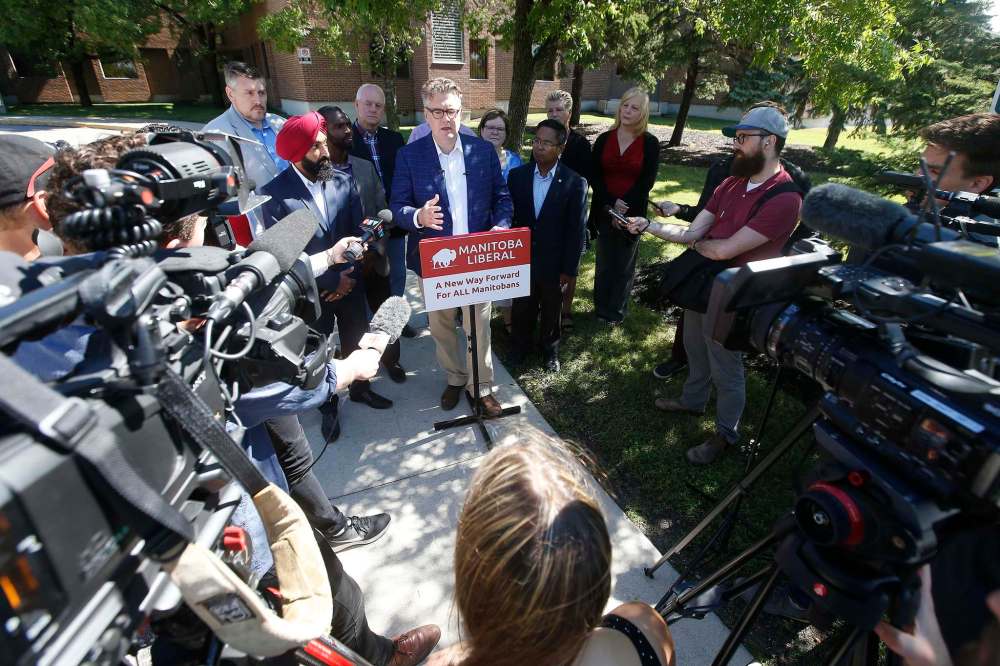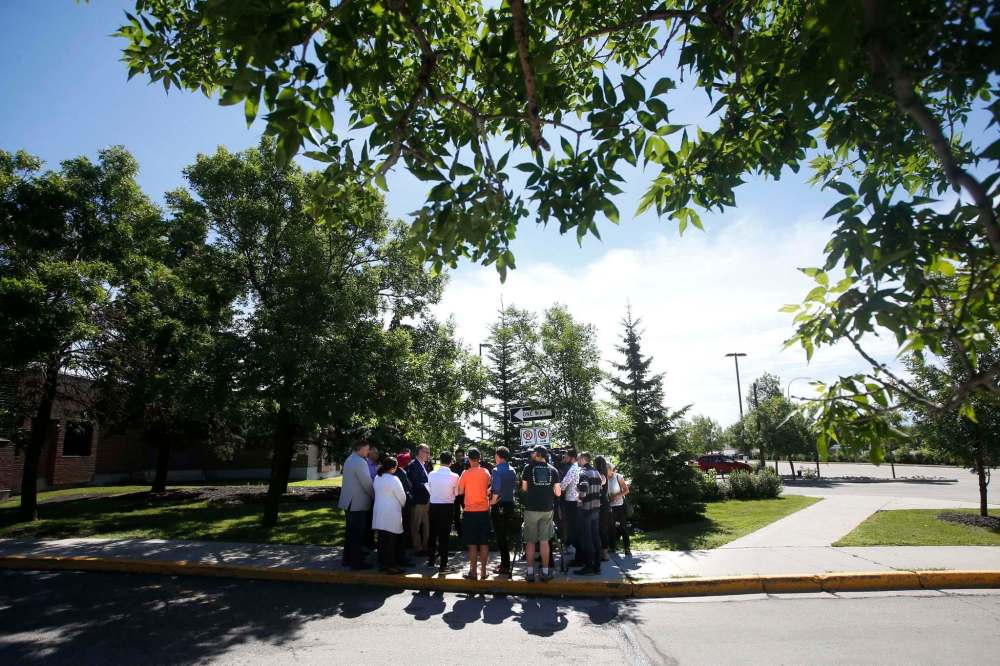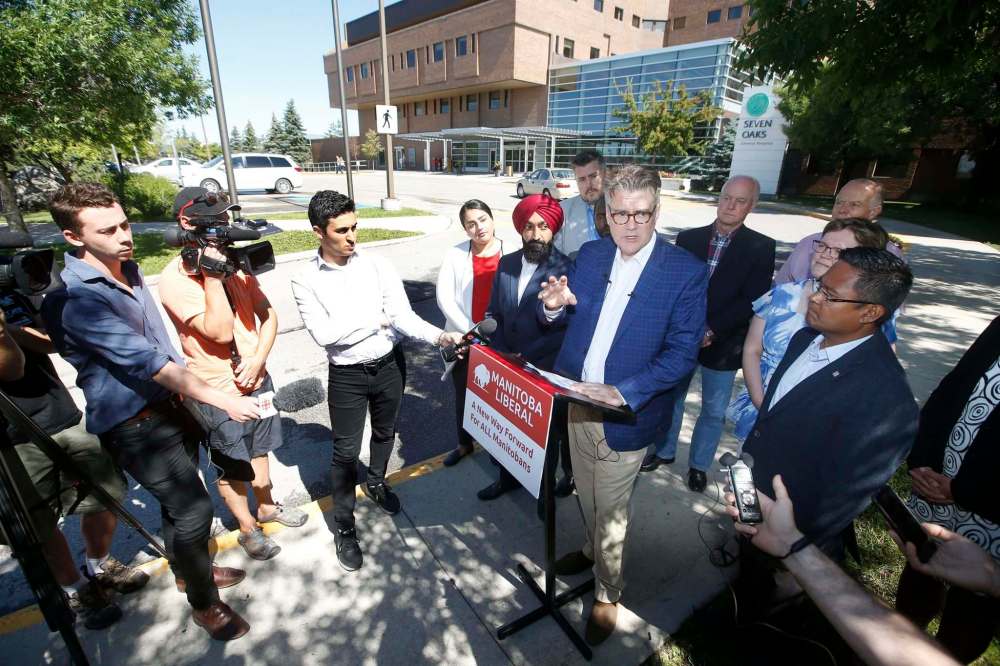Liberals promise to reorganize health care
Advertisement
Read this article for free:
or
Already have an account? Log in here »
To continue reading, please subscribe:
Monthly Digital Subscription
$0 for the first 4 weeks*
- Enjoy unlimited reading on winnipegfreepress.com
- Read the E-Edition, our digital replica newspaper
- Access News Break, our award-winning app
- Play interactive puzzles
*No charge for 4 weeks then price increases to the regular rate of $19.00 plus GST every four weeks. Offer available to new and qualified returning subscribers only. Cancel any time.
Monthly Digital Subscription
$4.75/week*
- Enjoy unlimited reading on winnipegfreepress.com
- Read the E-Edition, our digital replica newspaper
- Access News Break, our award-winning app
- Play interactive puzzles
*Billed as $19 plus GST every four weeks. Cancel any time.
To continue reading, please subscribe:
Add Free Press access to your Brandon Sun subscription for only an additional
$1 for the first 4 weeks*
*Your next subscription payment will increase by $1.00 and you will be charged $16.99 plus GST for four weeks. After four weeks, your payment will increase to $23.99 plus GST every four weeks.
Read unlimited articles for free today:
or
Already have an account? Log in here »
Hey there, time traveller!
This article was published 14/07/2019 (2343 days ago), so information in it may no longer be current.
The Manitoba Liberal party has revealed its remediation plan for the health-care system, a plan the party says would slash bureaucracy and potentially preserve emergency rooms at Seven Oaks, Concordia and Victoria hospitals.
Liberal Leader Dougald Lamont outlined the plan during a Sunday morning press conference in front of Seven Oaks General Hospital, where the emergency room is slated to be downgraded to an urgent care centre. Lamont pinned the blame for that emergency room closure and others on both the incumbent Progressive Conservative government and previous NDP governments.
“The NDP, who are supposed to care so much about health care, came up with a plan to close the ERs,” Lamont said. “And the Pallister government and the Manitoba PCs — supposed conservatives — are responsible for creating a massive, undemocratic, costly, centrally planned health-care system that has routinely delivered some of the worst results in Canada, and it has stripped local communities of their say in health care.”

The Liberal plan would do away with regional health authorities (RHAs) and centralized health-care administration and planning agency Shared Health. It would merge those agencies back into Manitoba Health. It would also transfer some decision-making power to local hospitals and clinics, Lamont said, meaning hospitals such as Seven Oaks would be able to make their own decisions about whether to reopen emergency rooms.
Lamont said consolidating RHAs and Shared Health into Manitoba Health would only result in the loss of upper-management positions in the long term, and would be cost-neutral. However, a background document provided by the Manitoba Liberals didn’t show the party’s math on how cost-neutrality would be achieved. Other aspects of the Liberal health-care plan would require new funding, Lamont said.
“The most important thing for us is to stabilize the system. We’ve also said we would lift the freeze that’s been in place for three years, and start filling positions, because there’s been a hiring freeze as well, to make sure that people are taken care of.”
Lamont claimed the plan would return accountability for RHA mandates back to the provincial health minister.
“A lot of this is about simplifying things, because right now we have a system where it’s not clear who’s responsible for anything,” Lamont said, flanked by 10 of his party’s candidates for the Sept. 10 provincial election.

“Is it the hospital, is it the RHA or is it the government? We want to make sure that it’s clear — it’s either the hospital, or it’s the government. And what’s happened for the past several decades is that the minister of health and the premier have been able to order changes in the health-care system and then deny responsibility for what they’re doing. And that’s not something that’s acceptable in a democracy, and it’s certainly not something that’s acceptable in a functioning health-care system.”
Hospital funding under the proposed Liberal plan would gradually shift to “patient-based funding,” which the party’s background document described as allocating resources based on the number of patients served and other evidence-based criteria. The plan would also develop networks of medical specialists, similar to CancerCare Manitoba, that would address issues such as brain health and mental health, cardiac health, diabetes, womens’ health and Indigenous health across the province.
In a statement, a spokesperson for provincial Health Minister Cameron Friesen said the Liberal plan “goes against the advice of clinical planning experts, requires leadership at local health facilities to seek approval from government for routine decisions and would cost untold millions to implement — millions that could be better spent on improving patient care.”
“After years of NDP mismanagement, we are repairing and transforming our health-care system,” said the Progressive Conservative spokesperson, citing improved wait times at Winnipeg hospitals.
Opposition NDP Leader Wab Kinew suggested that his party agreed with the idea of reducing health-care bureaucracy, but assailed the Liberal plan for leaving decisions about emergency rooms to hospital administrations.

“It is concerning the Liberal leader has failed to commit to reopening the emergency rooms Pallister closed,” Kinew said through a spokesperson. “These ERs needs to stay open and the NDP is the only party committed to doing that.”
solomon.israel@freepress.mb.ca
Twitter: @sol_israel


History
Updated on Sunday, July 14, 2019 3:49 PM CDT: Adds writethru, photos
Updated on Sunday, July 14, 2019 7:59 PM CDT: Edited

